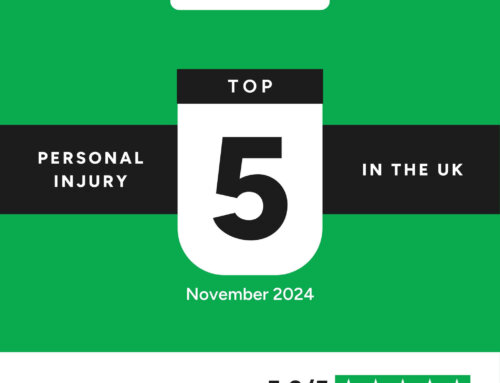Injury Awareness Week is an annual event promoted by The Association of Personal Injury Lawyers (APIL). It is a week devoted to raising awareness of the injuries needlessly suffered every day by people who are the victims of the negligence of others.
In an ideal world, personal injury solicitors wouldn’t exist. There would be no need for them. The whole reason why firms like Mooneerams exist is that people are negligent (careless), and their negligence leads to accidents in which other people get injured.
The law allows the injured victims of accidents that aren’t their fault to claim for and be awarded damages (compensation) from the person or corporate body responsible. Personal injury solicitors help the accident victim (claimant) navigate the complicated process of recovering the right amount of compensation.
However, whenever news reports are critical of the high numbers of personal injury and clinical negligence claims being taken through the court process, the press, government, and insurance companies blame personal injury claimants and their solicitors. Always. Can you remember seeing a news item lambasting the people responsible for those accidents? Probably not.
So, let’s refocus.
Accidents can happen anytime and anywhere, but who’s to blame?
We can be the authors of our own misfortune, e.g., when hammering a nail and inadvertently hitting our thumb.
Alternatively, we may be the victim of someone else’s negligence because:
- They drive into the back of our car.
- We fall from height at work when the ladder we use collapses because it is faulty.
- We trip over a defect on the pavement, which the local council hasn’t repaired despite it having been reported to them months ago.
- We have a leg surgically amputated because medical professionals mismanaged our diabetes.
An accident that wasn’t our fault is something we have no control over.
- We put our trust in another road user not to harm us.
- We put our trust in our employer to provide us with a safe environment to work in and suitable tools and equipment to do our job.
- We trust the local council to keep the pavement free from defects that could cause us harm if we fall over them.
- We put our trust in healthcare professionals to manage our diabetes correctly.
Compensation – attempting to put the wrong right
When we suffer injury in an accident that wasn’t our fault, we are entitled to bring a claim against the person who caused the accident. The compensation we claim is intended to put us back into the position we were in immediately before the accident happened. The figures awarded for personal injury compensation aren’t plucked out of thin air. They are arrived at by using the following:
- Legal precedent’ (amounts of compensation awarded in previously decided cases of a similar nature)
- ‘The Judicial College Guidelines for the Assessment of General Damages in Personal Injury Cases’.
Many people suffer serious injuries as a result of accidents caused by others. When we read press reports of accident victims receiving damages awards running into the millions of pounds, the headlines tend to use words which suggest the injured party has won something akin to the lottery, as in:
‘Man wins £2 million in compensation following a car accident.”
Nothing could be further from the truth. Suppose a person suffers permanent paralysis of all limbs (Quadriplegia) as a result of a car accident that wasn’t their fault. In that case, they will probably claim compensation against the negligent driver who caused the accident. Catastrophic injury claims often see the claimant being awarded a significant seven-figure sum as compensation at court.
The amount of compensation will include damages for ‘pain, suffering and loss of amenity’ (injury compensation). This amount could be in the region of £400,000 at its highest level.
However, remember that damages awarded by a court in a personal injury claim are an attempt to:
‘Put the accident victim back into the position they were in immediately before the accident happened’.
No sum of money can ever compensate someone for suffering a life-changing injury. Nor can it put them back into the position they were in just before the accident. Nevertheless, a personal injury solicitor’s job is to build a case that ensures every possible requirement for making the injured victim’s life as comfortable as possible is catered for.
So, as well as claiming compensation for the injury itself (known as general damages), other items claimed may include the following (special damages):
- Loss of earnings – both past and future
- Loss of pension entitlement
- Cost of adapting the victim’s current home to their new circumstances or even buying a new home
- Cost of appropriate care for the injured person for the rest of their life
- Employment of case manager – to ensure all the person’s medical and care needs are being properly looked after
- Gardening and housework costs
- Medical treatment costs
- Medical expenses
- Cost of specialist equipment
- Therapy costs
- Cost of adapted vehicle
- Periodic payments (payments made to a claimant if their circumstances change after settlement of the claim)
- Expenses and costs applicable to meet a particular individual’s requirements
The list above is not exhaustive. However, it’s easy to see that even the cost of providing professional care and assistance for someone’s lifetime can be hugely expensive. In other words, it isn’t difficult to see why serious injury compensation awards often run into millions of pounds.
There is no windfall – a compensation claim just ensures the seriously injured victim of another person’s negligence gets a chance to live as comfortably as their new ‘reality’ permits them to.
Injury Awareness Week is a chance to focus on the victims of accidents. According to research for APIL by YouGov, 30,000 people a week believe they are the victims of negligence, whether in the workplace, in a road traffic accident or due to medical negligence. That’s an awful lot of negligence and, conversely, an awful lot of people suffering injury or illness due to something that could and should have been avoided.
Negligence can be avoided. We all have a responsibility to take proper care every day of our lives.









